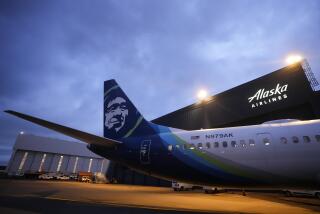Expanded Probe of Boeing Ordered
- Share via
Air Force Secretary James Roche said Monday he had asked the Pentagon’s inspector general to expand an investigation of a deal for aerial refueling tankers from Boeing Co. to include other major contracts awarded to the aerospace company as far back as 2000.
The 14-year, $27-billion program to start replacing the Air Force’s aging fleet of tankers with new 767 jetliners that would be converted into tankers is on hold while the inspector general investigates whether Darleen Druyun, then the service’s No. 2 acquisition official, improperly gave Boeing proprietary data from another bidder, the European Aeronautic Space & Defense Co.
Roche said he had asked that the probe include “any major programs with Boeing that Ms. Druyun was involved in” during the two years before she left in December 2003.
The review is likely to include contracts for upgrading NATO early warning surveillance aircraft, for space programs and for a new bomb, Roche said.
The secretary said he also had asked for a review of the 1998 competition between Boeing and rival Lockheed Martin Corp. in which Boeing was awarded 21 of 28 launches for a new rocket booster program worth up to $1.5 billion.
Roche said he had no indication that Druyun improperly influenced any of the contracts that he asked be included in the inspector general’s probe.
The intent is “to reassure [Defense Secretary Donald] Rumsfeld and [Deputy Defense Secretary] Paul Wolfowitz that all efforts were taken to ensure there were no more potentially tainted contracts,” Roche said.
Boeing fired Druyun and Chief Financial Officer Michael Sears on Nov. 25 after determining the two had broken company rules by discussing Druyun’s hiring while she was negotiating the tanker contract for the Air Force, and then concealing those contacts from Boeing’s board. Druyun disqualified herself from the Boeing negotiations on Nov. 5, 2002; she joined Boeing in January 2003 as head of its Washington missile defense office.
Wolfowitz on Dec. 1 asked Pentagon Inspector General Joseph Schmitz to conduct a preliminary inquiry to “determine whether there is any compelling reason why the Air Force should not proceed with its tanker lease program.”
The Air Force and Pentagon are holding up signing a contract for roughly $2 billion for lease payments on the first 20 aircraft until this determination is made.
Boeing spokesman Doug Kennett declined to comment. Druyun’s attorney, William Sheehan, also declined to comment.
The Air Force decided in July that Boeing had cheated in the rocket booster competition because it had possessed thousands of Lockheed Martin documents. As punishment, the service shifted seven launches to Lockheed and temporarily suspended three Boeing space business units from receiving Air Force contracts.
Federal prosecutors, in an investigation that is continuing, charged two former Boeing employees with conspiracy to possess Lockheed Martin trade secrets.
Here are some of the major Boeing contracts that were awarded within the time frame the inspector general recommended to Roche:
* A contract modification to continue and complete the modernization of NATO’s 17 AWACS early warning aircraft that increased the value of the work to more than $1.3 billion.
* A $336-million initial production contract for a communications satellite called the Wideband Gapfiller.
* A contract worth as much as $4 billion to upgrade the cockpit and electronic components on C-130 Hercules turboprop transports.
* A $235-million production contract for the joint direct attack munition and a $47-million development contract on a new 250-pound, small-diameter smart bomb.
More to Read
Inside the business of entertainment
The Wide Shot brings you news, analysis and insights on everything from streaming wars to production — and what it all means for the future.
You may occasionally receive promotional content from the Los Angeles Times.









